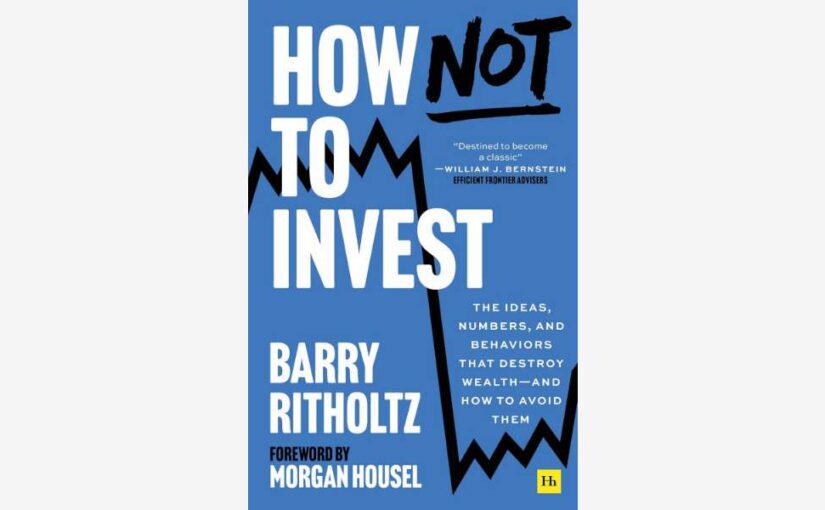Hello and Welcome. This page is a collection of 30 quotes from How Not to Invest book by Barry Ritholtz that I liked and saved while reading this book. I hope you will like these quotes too.
By the way, I am Deepak Kundu, an avid book reader, quotes collector and blogger.
Quotes on Investing
- Investing is the art of using imperfect information to make probabilistic assessments about an inherently unknowable future.
- Investing is a massive problem-solving exercise. The best at it are intellectually flexible; they approach their craft as a discipline, and focus on process. They understand probability theory and view mistakes as learning opportunities. They use mental models and engage in second-order thinking; they use counterfactuals; they have good information hygiene. They possess a high level of self-awareness regarding their own psychological states. They know they have blind spots and are aware they don’t know what they don’t know.
- The three most important words in investing are, “I don’t know.” Not saying those three words has cost investors billions.
- When the world changes, but our models don’t, we run into trouble.
Quotes on Portfolio Management
- Recognize you cannot know what is going to happen in the future, and any investment plan that is dependent on accurately forecasting where markets will be next year is doomed to failure.
- A strong process is a guarantee – not of outcome or results, but of a higher probability of obtaining your desired results. That’s why process is so important to investors.
- Don’t try to time the markets You lack the skill, the discipline, and the ability. Even if you get lucky, it’s just that – dumb luck – and that serendipity is likely to encourage you to engage in even more reckless and foolish behavior in the future. The odds of you jumping out on time and getting back in are stacked against you. Add in taxes and other costs, and it becomes a fool’s errand.
- Boring, steady portfolios can withstand anything you throw at them.
Quotes on Index Investing
- Indexing has moved from an abstract theoretical approach to investing widely ignored by investors to a key methodology for millions of people, despite – or perhaps because of – the disdain Wall Street has shown.
- All other things being equal, simplicity beats complexity every time. A portfolio of passive low-cost indexes should make up the core of your holdings. If you want to do something more complicated, you need a compelling reason.
Quotes on Personal Finance
- Any significant financial decision you make should be circumspect, carefully considered, and according to plan. If you are merely reacting to the latest market moves, breaking news, or headlines, then what you have is not a plan – you have an instinctual, fear-driven reaction, and that’s the makings of a disaster.
- Don’t buy things you cannot afford, won’t actually use, and that will cause you more pain than pleasure.
Other Quotes
- We too easily mistake randomness for skill. We imagine we see the future when we hardly understand today. We readily convince ourselves we are in control of our own destinies, when nothing could be further from the truth. Recognizing your own ignorance is an advantage. Most of Wall Street hates this fact.
- Investors become bullish after they buy stocks, bearish after they sell them; it is part of the process of how we rationalize our decisions, and justify our behavior. This tendency to be backwards-looking is hard-wired.
- The symbiotic relationship between the media and Wall Street drives a relentless parade of money-losing tomfoolery: Television and radio have 24 hours a day they must fill, and they do so mostly with empty nonsense. Print has column inches to put out. Online media may be the worst of all, with an infinite maw that needs to be constantly filled with new and often meaningless content. Just because the beast must be fed, does not mean you must be dragon fodder.
- History shows us that people are terrible about guessing what is going to happen – next week, next month, and especially next year. We are error machines, a mess of biases and emotions. We prefer to seek out, notice, and remember that which agrees with our prior thinking. The experts are no better than the public at large.
- I want you to be more skeptical of other people’s advice, and more independent. It is your money, and you must think for yourself. The goal is to move you toward a healthy skepticism – not to be negative about everything, but simply less naïve than you were before.
- People don’t know because they can’t know. Anyone who pretends they know what is coming next is selling something. Instead of predicting, learn to think about the world in terms of probabilities. It is humbling, and it allows you to think more flexibly.
- Recognizing how little you know is a superpower. If we were less certain of ourselves and had more humility, we would all be better investors.
- Modern technology moves so fast that no one can possibly keep up with it all. This includes professors at Harvard, investors in Silicon Valley, and everyone geographically and technically in between.
- Markets are a hall of mirrors, and each new piece of information sets off a cascade of reflexivity, actions and reactions that are nearly impossible to predict. Those who can think of the second- and third-order effects stand to make a fortune.
- Market crashes are great – if you have capital handy, are not near retirement age, and can manage your emotions and behavior. Its counterintuitive, and not how most people think about wrenching dislocations.
- You must have the courage of your conviction. If you really believe in a trade, it should be meaningful enough to affect your profits. Otherwise, why bother?
- Too much leverage, living beyond your means, and too little patience to get rich slowly. That killer combination makes anyone vulnerable to sudden price drops in the assets they hold.
- Panic-selling is easy, getting back in at the lows is hard, not ever getting back in is ruinous.
- In markets, panic does not make anything better and often makes things worse – and occasionally much worse.
- People active in party politics – donors, organizers, true believers, and activists – shouldn’t be allowed anywhere near your investment portfolio or your psyche. The reverse is also true: Anyone running money should avoid party politics since it leads to a lack of the objectivity and dispassion needed to do the job well. Politics is a huge distraction; it is rarely compartmentalized and typically leads to ill-considered emotional decision-making.
- Bull and bear markets come along on their own timelines, stay for as long as they like, then move on. There is not a whole lot you can do about it, except recognize that it happens.
- The future is inherently unknown and unknowable. Those who claim otherwise are selling something.
- You must be a disciplined investor. You should have an investment philosophy that can be expressed in a portfolio. This philosophy should include specific rules that you do not ignore. You want a portfolio with low costs, low turnover, low taxes, and a long holding period. Your success must not depend on news, overhearing tips, or market gossip.

